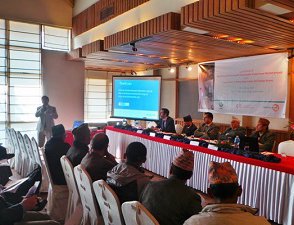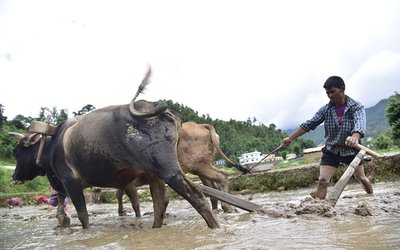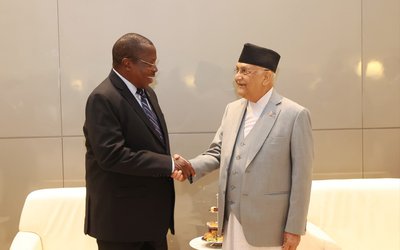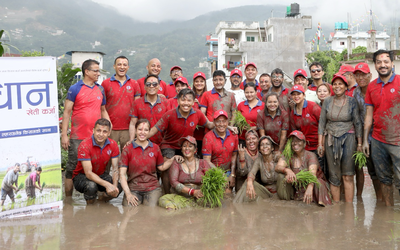
With an investment of a small amount of money, a household can be freed of smoke. Having worked in the rural parts of Nepal to make households smoke free, Practical Action has launched results-based financing for sustainable Hood-Stove Market Project.
At a time when government's aim is to ensure Nepali homes become smoke-free by 2017, the new project launching of Practical Action Nepal, which has been advocating action on indoor air pollution for many years, will bring a lot of change in rural households. This was noted at an interaction on Technology Justice in energy access as well.
“The government is ready to work together with Practical Action Nepal in its campaigns to make Nepal become smoke free,” said Professor Dr. Govinda Nepal, member of National Planning Commision. "The government is committed to provide clean cooking solutions to all by 2017. Government provides support to the project”
In the last few years, Practical Action Nepal has already installed a number smoke hoods in Nepal along with Alternative Energy Promotion Center (APEC), government’s leading institution.
“We have been working with various organizations to promote alternative energy throughout the country to make the government efforts successful,” said Ram Prasad Dhital, executive director of Alternative Energy Promotion Center. “With the expertise, Practical Action Nepal has also been launching various programs.”
Vishwa B. Amatya, Practical Action, welcomed the participants and Min B. Malla briefly highlighted the project objectives and modalities.
According to a study made by WHO, more than 8700 people, mainly women and children, die prematurely due to household air pollution, mainly generated from inefficient air polluting stoves.
After conducting a detailed research, Practical Action developed a hood-stove technology (package of specifically designed smoke-hood and an improved biomass cook-stove) to provide clean, efficient and safe cooking solutions to rural households.
With financial support from GIZ EnDev, the project will be implemented using results financing measures to establish sustainable market of the hood-stoves. Within the four years project period, 30,000 households from Gorkha, Dhading, Rasuwa and Makwanpur districts will directly benefit from the project.
Practical Action has also has been working in technology justice and energy access. By providing smoke free hood-stove, Practical Action has been increasing the access to clean energy.
Apart from the project launching, Practical Action also held workshop about “Technology Justice in Energy Access”.
“Technology Justice is essential to achieve development and sustainable wellbeing for all. Today’s technological innovation is far more likely to be aimed at enhancing the lifestyles of the populations whose lives are already comfortable - wealthy consumers in developing countries, than it is at meeting the needs of those living in poverty,” said Achyut Luitel, Regional Director of Practical Action South Asia Regional Office, clarifying about the concept of Technology Justice.
As there is a huge gap of technology to provide energy justice, Practical Action wants to lead a change in the way the world approaches and governs technologies, for overcoming the injustices to create a world where everyone has access to appropriate technologies – a world with Technology Justice.
Similarly, Nawa Raj Dhakal, Assistant Director, AEPC, mentioned that with “AEPC’s support many poor households have now access to clean energy.”
Dr. Rabindra Dhakal from National Academy of Science and Technology highlighted the importance of innovation and technology development for increasing energy access for the poor people and ensuring Technology Justice.
Practical Action projects has advocated action on indoor air pollution for many years, especially in Nepal where many rural homes rely on traditional energy resources such as wood for cooking and heating their homes. These fuels contribute to significant levels of smoke causing health hazards, mostly for women and children.
Practical Action has shown that Hood-Stove can make a lot of difference in bringing Practical Action works directly with those affected by indoor smoke to cut indoor air pollution and improve health. It also works with governments and other agencies to scale up this approach beyond the projects.
Recently Nepal government announced that all homes in Nepal would be smoke-free by 2017. And the Global Alliance for Clean Cook-stoves aims to provide 100 million clean-burning stoves to villages in Africa, Asia and South America by 2020.
Practical Action focuses mainly on developing and testing new innovative ideas to engage the private sector in providing access to modern energy resources for the poor, and also developing enabling environment for increasing the role of private sector in energy access and increasing access to finance. It will demonstrate decentralized energy systems with particular focus on achieving minimum energy standards and total energy access to achieve universal access to energy by 2030.
- MELAMCHI WATER SUPPLY: No Interruption During Monsoon
- Jun 25, 2025
- KOREAN RETURNEES: Successful Integration
- Jun 25, 2025
- UPPER TRISHULI-1: Engaging With Local
- Jun 25, 2025
- IME GROUP: Twenty Five Years Of Journey
- Jun 24, 2025
- NEPAL’S AIR POLLUTION: A Growing Health Concern
- Jun 24, 2025















